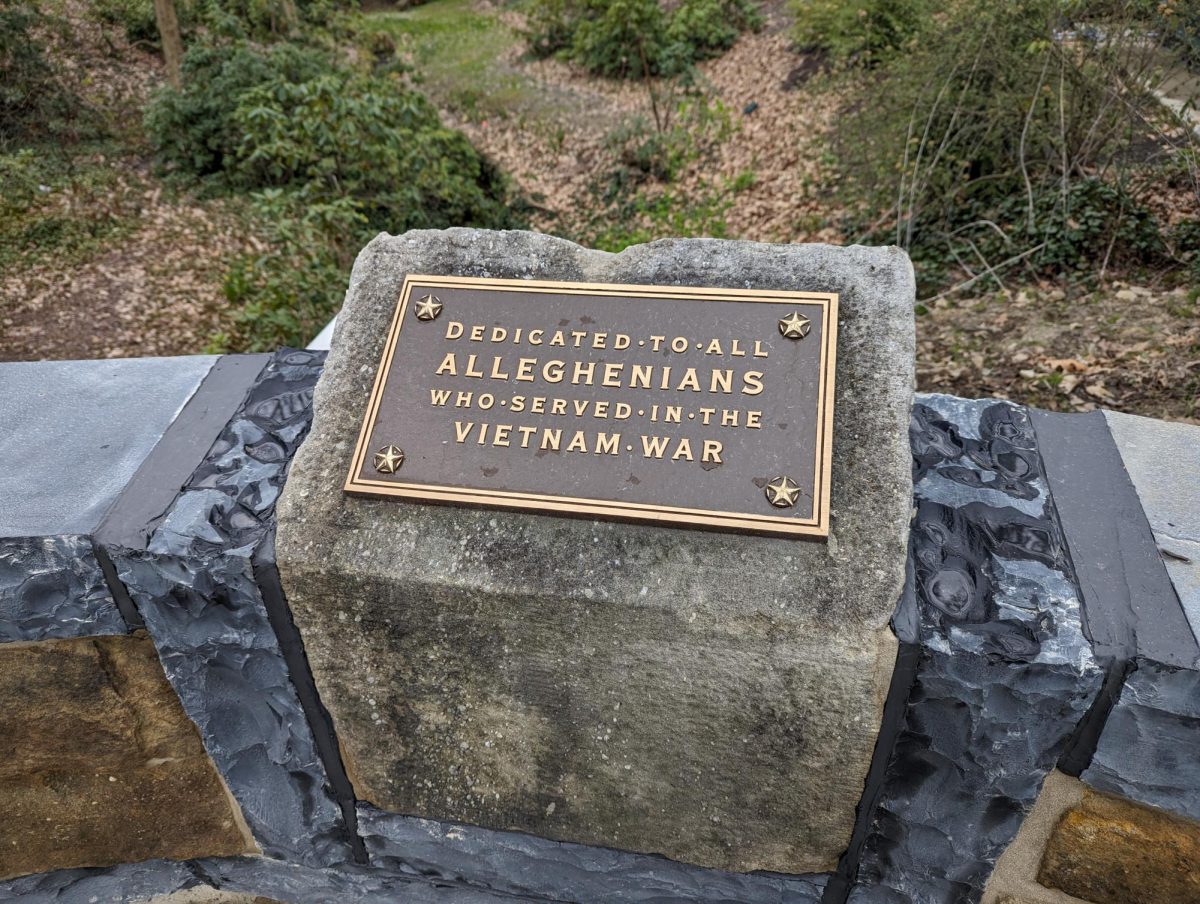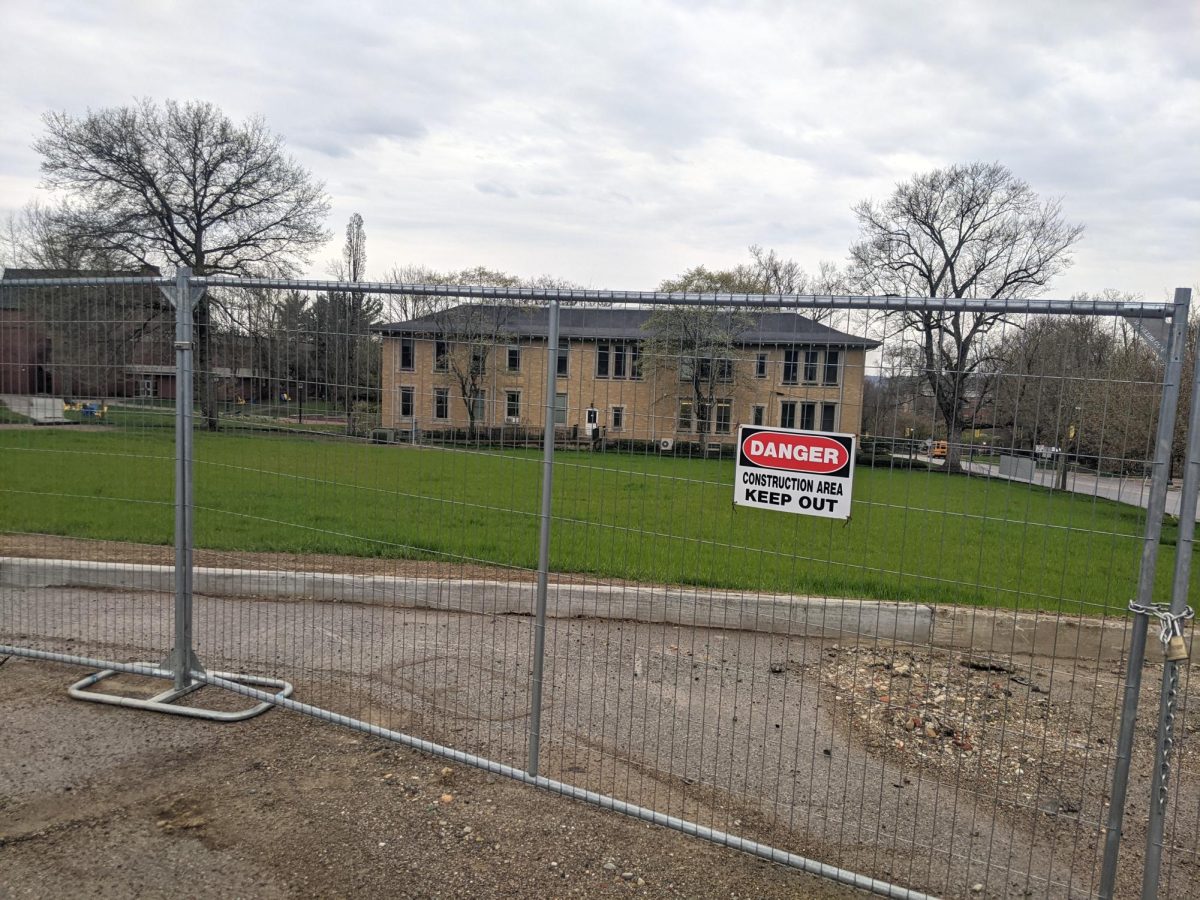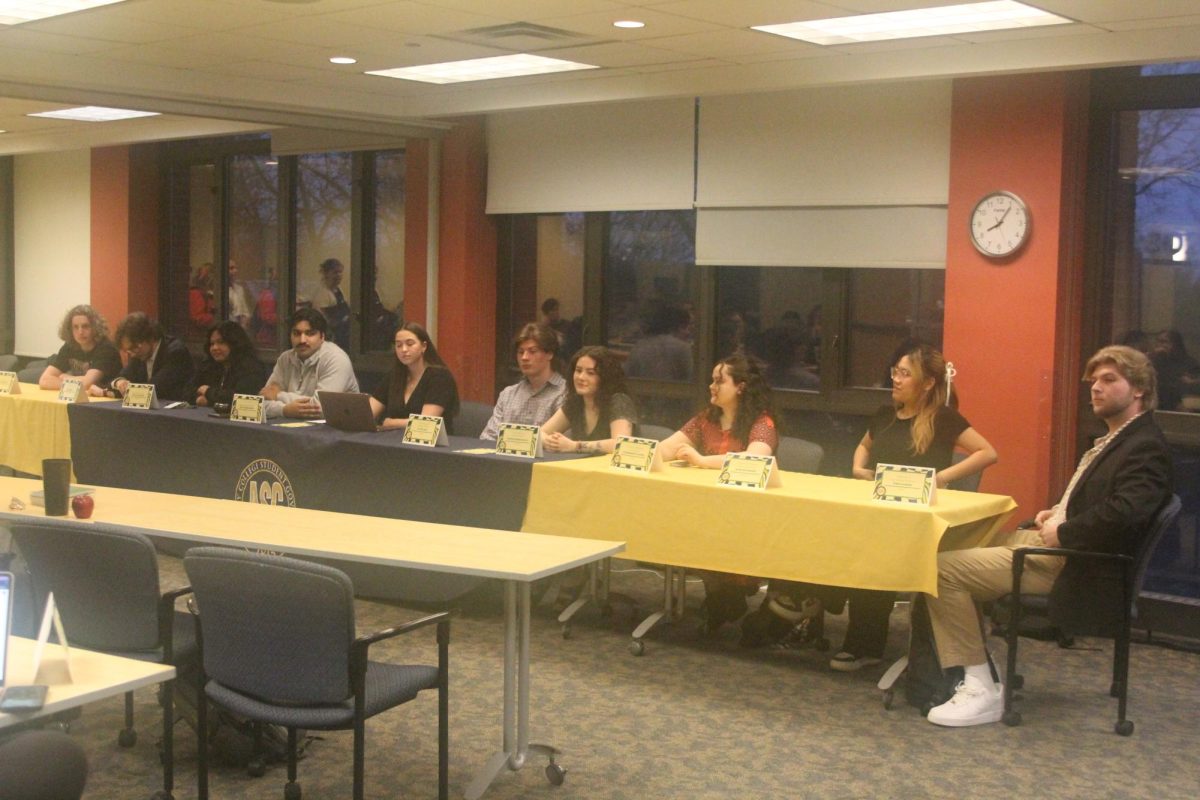Although many details remain unclear about the possibility of hydrofracking in Allegheny’s Bousson Experimental Forest, conversations are progressing about the general logistics, implications and risks involved with hydrofracking.
In the second of this semester’s series of informational sessions moderated by the Bousson Advisory Group, a panel of executives and legal experts answered questions from the approximately 50 students, staff, faculty and community members in attendance.
Much of Wednesday’s discussion centered around hydrofracking’s legal implications and their relationship to environmental risks.
Panel member Jake Polochak is a leasing attorney and managing partner at the law firm Morascyzk & Polochak. The firm represents landowners in the Appalachian Basin, specifically within the context of the region’s developing gas and oil industry.
Polochak said that if Allegheny were to consider signing a lease with a company interested in fracking, it should prioritize its control over the property.
“I would recommend to any landowner the first criteria you need to meet, unless you’re willing to sell your property…is satisfactory landowner control and surface protection,” Polochak said. “From there, I would move into the type of production incentives I could get in the lease.”
He went on to say that most gas companies he has worked with have been reasonable negotiators in terms of incentives and surface rights.
“Frankly, most gas companies leasing in this area at this time are more than willing to offer landowners satisfactory landowner protections,” Polochak said. “The landowner can play a large role in what surface activity will occur, and where it will occur.”
Panel member Susan Stout, a project leader at the U.S. Forest Research Service, said that it is important to remember the wide range of aspects encompassed by the word “surface.”
“The picture of the surface impacts need to include the roads, the fragmentation of the forest, the containment of methane leaks in the well pad and in the infrastructure and the burden of truck traffic on local community,” Stout said.
She said the federal government only acquired the surface of the Allegheny National Forest when they established it in 1923. They did not acquire the mineral rights.
Another panel member was Richard Neville, an environmental group manager with the Department of Environmental Protection. Neville said that from a surface standpoint, the biggest problems within the gas and oil industry are related to site preparation issues.
“It’s not the process of drilling the well that usually causes the problem. It’s the site preparation that it takes to get in there to do the work,” Neville said.
There are many abandoned wells in the western Pennsylvania region. In the first information session, Jack Ubinger, senior vice president of the Pennsylvania Environmental Council, said that it would not be wise to drill near abandoned wells.
“You should be looking for the orphan wells because if they are there you shouldn’t drill there, because they are artificial pathways,” Ubinger said.
Neville explained that drilling operators are ultimately responsible for any unforeseen accidents associated with drilling, whether or not they really caused the problem.
However, Polochak clarified that this responsibility only applies if the affected landowner has a contractual relationship with the driller who may have caused an impact.
“If you had the property next door to a well and didn’t have a lease with that operator, your only recourse would be through the DEP,” Polochak said. “The DEP would have to plead jurisdiction of how that was handled.”
During the first six months after a well has been drilled, a presumptive liability stipulation exists saying that any water contamination occurring within a 2,500-foot radius of the well is automatically assumed to be the operator’s fault.
“The Department has the right to order the operator to fix that water,” Neville said. “If you’re not within that period of time, then it becomes the Department’s burden to determine whether the company caused the problem.”
Within the period of presumptive liability, operating companies are automatically obligated to restore or replace the contaminated water with water of equal quantity and quality. If a problem is identified after the initial 6-month period, the DEP investigates the reason for the problem before automatically assuming the operating company is guilty.
Neville said that water is often already above the maximum contaminant limit established by the federal government before drillings begins. Many people do not realize their water has high levels of iron or manganese.
He said that in these cases, the government is not required to restore water levels all the way back to the MCL. However, the government does encourage application of treatment systems to the contaminated water.
“Where you run into a little bit of issue with this is the Department of the Commonwealth cannot tell the operator what he chooses to do. So you may have a disagreement with the operator on what exactly constitutes restoring or replacing the water,” Neville said. “But at the end of the day, it’s our responsibility to make sure that your water after impact is as good as it was before the impact.”
In regards to the streams at Bousson, Neville referenced the water management plans designed by the Department which dictate safety terms for operators working in areas with water supplies.
“We’re comfortable that if you follow that water management plan, that we don’t have negative impacts on the streams,” Neville said.
Associate Professor of Biology Catharina Coenen inquired about the long-term integrity and durability of the wells.
“When the College is at its 400-year anniversary, how are we going to think back about this? What do we know about how well those wells might hold up?” Coenen asked the panel.
President of Universal Well Services, Inc. and Allegheny alumnus Roger Willis, ’80, said that although it is required to close up wells after drilling is completed, that there is not much risk of leakage from wells.
“The worry of gas migrating…to the surface from a depleted well is truthfully very low,” Willis said.
He explained that as a well is being drilled, there are several different pieces of casings under the ground, grouted in place. When plugging the well up after drilling is complete, the state requires operators to remove all free and movable casing, as well as replace it with impermeable cement.
He added that the cement would be of lower permeability than the rock that was underground in the first place.
“As the well would be depleted, the likelihood of any gas migration would cease to exist,” Willis said.
Geology major Douglas Barber, ’13, said that the risks of fracking are generally exaggerated.
“Bottom line is, it’s not as environmentally damaging as it’s thought to be,” Barber said. “As long as they follow procedure, it’s 100 percent foolproof.”
Polochak attested that the risk of dangerous accidents is low when it comes to drilling.
“I deal with a lot of concerned landowners who want to know, how is this industry going to kill me?” Polochak said. “And I say, ‘best chance, truck accident.’”
Associate Professor of Geology and advisory group member Ronald Cole asked the panel about the specific concerns involved with hydrofracking in western Pennsylvania.
“We’ve heard about this in other parts of the state, but the geological conditions are far different here than elsewhere. So talking specifically about western Pennsylvania, what sort of criteria are available at this point to evaluate?“ Cole asked.
Cole specified that he was interested in the potential effects on the surface as well as on shallow groundwaters.
Neville replied that fracking in the western region of Pennsylvania is less risky than in other parts of the state due to the strong rock lying underneath the area.
“When you’re talking about western Pennsylvania, you are talking about more competent [rock] formations than you are in other parts of the state. So when they started drilling Marcellus wells over by…Susquehanna County…you had issues with…the shallower gases, formations, getting disturbed,” Neville said.
He added that this region’s primary concern when drilling should be the large quantity of abandoned wells.
“The other side of the coin though is, in western Pennsylvania you have hundreds of thousands of many old holes in the ground,” Neville said, referring to the many abandoned wells in the state. “Some of them are plugged, some of them are not. There are many that we don’t even know about.”
Associate Professor of Economics Stephen Onyeiwu, a member of the advisory group, asked if any specifics are currently known about the amount of money the college is looking at if it chooses to negotiate drilling in Bousson.
“Some members of the community have said the decision depends on what the economic benefits are…to coming in, doing seismic testing and exploring for gas,” Onyeiwu said. “Therefore, it would be very difficult to really make a decision without knowing those facts.”
Willis said that a specific amount of money cannot be predicted at this point.
“There are a couple wells that have already been drilled [Lippert Well] really close to the Bousson….the productivity of that well isn’t known yet,” Willis said. “So that’ll…establish a baseline. In this area there’s been really no Marcellus exploration, because it’s very thin, and the Utica is still in very early stages of development.”
He added that another important consideration to consider is the part of the property which would be assigned to the lease.
Polochak agreed that leases have many different variables, and therefore a specific amount is almost impossible to define at this early stage.
“You would need a crystal ball to know what you were signing…but going by what others are signing around here, you would sign between $1,500 and $40,000 an acre to sign that lease,” Polochak said. “Whether you see production royalties down the road or not, would depend on a thousand variables.”
He said that a non-surface lease is the most practical path for a private school property such as Allegheny to follow, explaining that this is because neighboring properties would likely explore joint leasing ventures with the college.
In the first informational session, advisory group member and Vice President of Finance and Administration Larry Lee said that even if the college did agree to allow seismic testing at Bousson, fracking still may not occur.
“One of the first steps is to do the seismic testing so they can understand more about the geology and where they may want to drill,” Lee said. “Even if we decided that we did want to do this, the geology may not support it, and they may not select Bousson as one of the sites that they want to explore anyway.”
Assistant Professor of Environmental Science and Studies Jack Meeder asked whether drilling operators in Pennsylvania are responsible for removing the well pad and all other changes to the surface after drilling is completed.
Polochak said that all of the leases analyzed at his firm require operating companies to remediate the disturbed surface, back to as close to the original conditions as possible. However, he added that he is unaware of any wells that have actually been pumped to completion.
“Even if the lease doesn’t address restoration of the site, the Pennsylvania regulations require that all wells drilled have to be restored within nine months of drilling. You have to restore the site…make it substantially the same,” Neville said.
Meeder expressed his concern with the gas companies’ credibility.
“That’s true, if the gas company doesn’t forfeit their bond to the state,” Meeder said.
Environmental Science major and Students for Environmental Action member Ahasanur Rahman, ’13, said that judging from these first two sessions, students and faculty seem very well-informed on the hydrofracking process.
However, he said that the first two discussions hosted by the advisory group have seemed very pointed toward a pro-fracking perspective.
“It seems, from these two sessions, that we as a community are being channeled in a direction and are being appeased into thinking hydrofracking is okay,” Rahman said in an email.
He added that all of the representatives of Wednesday night’s panel seemed clearly in favor of fracking.
“Most of the people here are tied to the industry group, or have their own interest. These attorneys are employed as long as hydrofracking is going on,” he said. “In their interest, they will work out leases and highlight how well those leases have worked.”
He said he felt that Stout was the only member of the panel attempting to highlight concerns.
“In between the leasing jargon, the panel in slight undertones kept saying, well, we need energy…But is this the kind of energy we want? It will take more than one more session to grapple with such an emotionally charged question,” he said.
As an Allegheny alumnus, Willis said that he cares about Bousson and its future.
“The simplest perspective is, Bousson is gorgeous. I was there, my German shepherd and I, when I was at Allegheny,” Willis said.
Because of his vested interest in the Allegheny community, Willis wanted to become involved in the talks hosted by the Bousson Advisory Group.
“I think there’s this impression out there that everyone involved in making energy is all fat cats and bad people…I mean we all use some, whether it’s for an iPad or whatever, we use energy – cosmetics, oil, all this kinda stuff,” Willis said. “So that’s why I thought it would be interesting to get involved in this.”
Skyler Ray, ’15, supports the idea of fracking at Bousson.
“It’d be a good economic resource, and I feel either way we’re going to get screwed as far as surface contamination, so we might as well get a slice of the pie,” Ray said. “It’s going to happen around us no matter what.”
Rahman said that the overall campus opinion on the proposed fracking at Bousson remains unclear.
“With SEA, we’re currently in the process of gauging an understanding of where the campus community stands, because that is not fully clear,” he said.
Justin Giel ’13, said at the first session that many people on campus are opposed to the idea of fracking.
“A lot of people on campus think it’s a terrible idea, that it goes against everything Allegheny has risen to represent these days, which is an eco-friendly approach to resources,” Giel said.
At the time of interview, Rahman said the group was working on gaining signage for an anti-fracking petition that would provide an understanding of how many people are against fracking, how many are still inquisitive about the process and how many genuinely do not know. When this article went to print, the group had succeeded in gaining signage for the petition and began circulating it that day.
Edited: Hydraulic fracturing is a casual way of referencing deep shale natural gas extraction.







Silas Russell • Feb 20, 2013 at 2:14 am
I find it incredibly disappointing that Allegheny is even considering fracking on its property. The Bousson has a long history with our school as a nature conservancy, not to mention that Allegheny is known for making strides to become increasingly environmentally friendly by supporting clean energy production and LEED certified construction. People are often misled to believe that natural gas is a clean fuel, but the process of extracting it is incredibly dirty and destructive. Allegheny should continue to lead the effort to move away from our outdated dependence on fossil fuels, not prolong it.
Silas Russell
’07
SageBabe • Feb 18, 2013 at 11:24 pm
It is actually stunning to this reader that not one person addressed the issue of how to safely dispose of the contaminated frack waste water. If it was discussed at the informational session, this should have been front and center. The process creates millions of gallons of contaminated water. In 2005, fracking was granted specific exemptions from the Safe Drinking
Water Act. Fracking is also exempt from key provisions within the Clean
Air Act and the Clean Water Act. Chemicals used in drilling and
fracking operations can be claimed as trade secrets; public release of
their identity is not mandated by federal right-to-know provisions. The
Environmental Protection Agency has limited jurisdiction over fracking. That’s a fact. Currently, there is no process whereby water can be de-contaminated and returned to the earth. It’s loaded with toxic chemicals and it’s nothing neighbors in Ohio, New York, New Jersey, West Virginia and Maryland want passed to them like it’s some cup of sugar. Until a Comprehensive Health Impacts Assessment is done, fracking should be in a holding pattern.